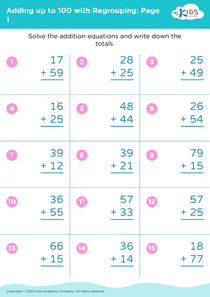Mathematical reasoning Adding up to 100 Without Regrouping Worksheets for Ages 3-7
3 filtered results
-
From - To
Introduce young scholars to the world of numbers with our "Mathematical Reasoning: Adding up to 100 Without Regrouping Worksheets for Ages 3-7." These engaging exercises are specially designed to help children master foundational math skills through fun and interactive worksheets. Ideal for preschoolers and early elementary students, our materials support developing mathematical reasoning by focusing on single and double-digit addition problems that don’t require regrouping. Ensure a well-rounded understanding of basic arithmetic principles while boosting confidence and enthusiasm for learning. Explore our collection to nurture your child’s cognitive growth and love for maths in their formative years.
Mathematical reasoning, especially tasks like adding up to 100 without regrouping for ages 3-7, is a critical foundation for a child's cognitive development. This period is crucial as young minds are especially responsive to learning new concepts. Parents and teachers should care deeply about this because it builds essential skills such as number sense, logical thinking, and problem-solving abilities.
Understanding addition without regrouping solidifies a child's basic addition skills, which are vital for more advanced mathematical operations, including subtraction, multiplication, and division. These skills are essential not only for academic success but for everyday activities such as handling money, measuring recipes, and telling time. Moreover, early exposure to these concepts can lead to a positive attitude towards math, reducing anxiety and fostering a mindset that math is approachable and solvable.
It's also important to consider that developing these skills involves practicing patience, attention to detail, and perseverance. When parents and teachers prioritize activities like adding up to 100 without regrouping, they ensure that children aren't just memorizing calculations but are genuinely comprehending mathematical relationships and patterns.
In essence, caring about and fostering early mathematical reasoning equips children with tools for broader academic challenges and everyday problem-solving, ensuring a solid foundation for lifelong learning and development.

















